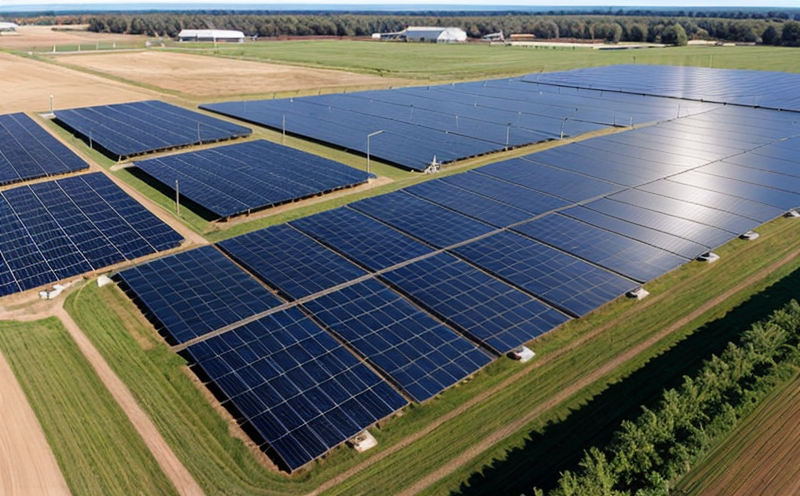ISO 14064 Greenhouse Gas Measurement Testing for New Technologies
The ISO 14064 series of standards provides a framework for the quantification and reporting of greenhouse gas (GHG) emissions, including those from emerging renewable technologies. This service focuses on providing precise measurement and verification testing to ensure compliance with these international standards.
New renewable technologies are often at the forefront of innovation in the energy sector, aiming to reduce environmental impact while meeting growing global demand for sustainable power solutions. These technologies include solar photovoltaics (PV), wind turbines, biogas systems, and hydrogen fuel cells. As these innovations mature, accurate measurement of their GHG emissions is crucial for validating their sustainability claims.
ISO 14064 specifies the methodologies for quantifying and reporting direct, indirect, and total GHG emissions. This service ensures that new renewable technologies are rigorously tested to meet stringent criteria, providing stakeholders with confidence in the environmental performance of these innovations. Our testing adheres strictly to ISO 14064-2:2018, which outlines the requirements for quantifying and reporting greenhouse gas emissions and removals by organizations.
The process begins with a thorough understanding of the technology's operational characteristics, including its energy inputs, outputs, and potential sources of GHG emissions. Specimen preparation involves replicating real-world conditions as closely as possible to ensure accurate testing results. Once prepared, our state-of-the-art instrumentation is used to measure key parameters such as CO2, CH4, N2O, and other relevant gases.
Instrumentation includes gas analyzers, flow meters, and thermal imagers capable of detecting even the smallest emissions discrepancies. Our laboratory facilities are equipped with controlled environments that simulate various operational scenarios, allowing for comprehensive testing under realistic conditions. This approach ensures that the testing results reflect actual field performance, providing a reliable basis for compliance verification.
The final step is generating detailed reports that document the GHG measurement process and results. These reports are meticulously prepared to meet international standards and provide clear, actionable insights into the technology's environmental impact. Compliance officers can use these reports to make informed decisions regarding procurement and investment in renewable technologies.
In summary, ISO 14064 Greenhouse Gas Measurement Testing for New Technologies is essential for validating the environmental credentials of emerging renewable technologies. By adhering to rigorous testing protocols and international standards, we ensure that stakeholders can trust the sustainability claims made by these innovative solutions.
Why It Matters
The global transition to renewable energy sources is critical for mitigating climate change. Accurate measurement of GHG emissions from new technologies is not only a legal requirement but also a key factor in establishing trust with stakeholders, including investors, regulators, and the public.
Compliance with ISO 14064 ensures that renewable energy projects meet international standards for sustainability. This compliance is essential for obtaining certifications such as Greenhouse Gas Protocol (GHGP) and participating in carbon trading markets. Accurate measurement of emissions also helps identify areas where improvements can be made, leading to more efficient technologies.
By validating the environmental impact of new renewable technologies through ISO 14064 testing, organizations demonstrate their commitment to sustainability. This not only enhances corporate reputation but also fosters innovation by providing clear guidelines for reducing emissions. Ultimately, this approach contributes to a greener future by ensuring that new technologies are as environmentally friendly as possible.
Why Choose This Test
- Accurate and reliable measurement of GHG emissions from emerging renewable technologies.
- Compliance with international standards, including ISO 14064-2:2018.
- State-of-the-art instrumentation for precise gas analysis and flow metering.
- Controlled testing environments simulating real-world operational conditions.
- Meticulous reporting that meets international standards and provides actionable insights.
- Expert technical staff with deep knowledge of renewable energy technologies.
- Rigorous quality control processes to ensure consistent test results.
Competitive Advantage and Market Impact
In the competitive landscape of renewable energy, compliance with international standards is a significant differentiator. Organizations that can demonstrate adherence to ISO 14064 are better positioned to secure funding and partnerships. This testing service not only ensures compliance but also provides valuable insights into optimizing emissions reductions.
By offering this specialized testing, we help our clients stay ahead of regulatory changes and market demands. Our rigorous testing process builds trust with stakeholders, which is crucial for attracting investment and maintaining a strong reputation in the industry. In addition, the detailed reports generated from these tests can be used to inform strategic decisions and drive innovation within organizations.
The results of this testing are particularly valuable in carbon trading markets, where accurate measurement of emissions is essential. Compliance with ISO 14064 standards ensures that projects meet the stringent requirements for participating in such markets, thereby enhancing their marketability and value. This service not only supports compliance but also contributes to the development of more sustainable technologies.
In summary, ISO 14064 Greenhouse Gas Measurement Testing for New Technologies provides a competitive edge by ensuring compliance with international standards, providing actionable insights, and building stakeholder trust. These advantages are crucial in the rapidly evolving renewable energy sector, where sustainability is at the forefront of innovation.





